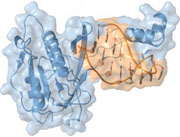


Jennifer Doudna, a biochemist with the Physical Biosciences Division, led a team that included Rachel Haurwitz, Martin Jinek, Blake Wiedenheft and Kaihong Zhou in a study that identified a key enzyme in a critical microbial immune system called CRISPR. Using protein crystallography beamlines at the Advanced Light Source, Doudna and her team produced a 1.8-angstrom resolution model of the crystal structure of Cys4, an endoribonuclease that initiates the production of CRISPR-derived RNAs, small RNA molecules that target and silence foreign DNA in the microbe. More>
 Research: Yeast's Sugary Diet Expanded to Include Plant Fiber
Research: Yeast's Sugary Diet Expanded to Include Plant Fiber Researchers at UC Berkeley have taken genes from grass-eating fungi and stuffed them into yeast, creating strains that produce alcohol from cellulose, which normal yeast can't digest. The feat could be a boon for the biofuels industry, which is struggling to make ethanol from plant fiber economically feasible. "By adding these genes to yeast, we have created strains that grow better on plant material than does wild yeast, which eats only glucose or sucrose," said Jamie Cate of Berkeley Lab’s Physical Biosciences Division. "This improvement over the wild organism is a proof of principle that allows us to take the technology to the next level, with the goal of engineering yeast that can digest and ferment plant material in one pot." More>
 Employee Development: Class on Enhancing Research Presentations
Employee Development: Class on Enhancing Research Presentations What’s the most effective way to present your research? On Sept. 21, the Berkeley Lab Learning Institute will offer a class on “Creating Effective Research Presentations” (BLI0116). This two-hour workshop, designed for postdocs, research associates, and scientists, provides tips on designing effective slides and avoiding common presentation mistakes. The course instructor is director of UC Berkeley’s Technical Communications Program. Registration is required.
 On Oct. 11, a new process for creating eProcurement requisitions will launch. This new, streamlined process will allow requisition preparers to enter data in a logical, intuitive sequence while providing them with online help. Also, several new features will be implemented including self-approval of requisitions under $1,000 (if allowed by the division), separation of duties between the requester/preparer/approver, and availability of online training. As the launch date approaches, additional information will be sent by Procurement to all current requisition preparers and approvers. Contact Eileen Nasto for additional information.
On Oct. 11, a new process for creating eProcurement requisitions will launch. This new, streamlined process will allow requisition preparers to enter data in a logical, intuitive sequence while providing them with online help. Also, several new features will be implemented including self-approval of requisitions under $1,000 (if allowed by the division), separation of duties between the requester/preparer/approver, and availability of online training. As the launch date approaches, additional information will be sent by Procurement to all current requisition preparers and approvers. Contact Eileen Nasto for additional information.
 Employee Activity: Lab Philosophy Club Meeting on Sept. 16
Employee Activity: Lab Philosophy Club Meeting on Sept. 16 The Berkeley Lab Philosophy Club is reorganizing after a hiatus and will meet on Thursday, Sept. 16, from noon to 1 p.m. on the lower level of the cafeteria. Employees and visitors interested in discussing philosophy are invited to attend. No formal training in the field is required. For more information, contact club president Peter McCorquodale.
Today
at Berkeley Lab encourages feedback and story ideas
Deadline for submissions is 10 a.m. two days prior to publication
TABL is produced by Public Affairs' Communications Group